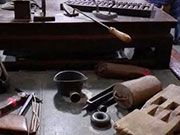People collect eccentric antiques

 0 Comment(s)
0 Comment(s) Print
Print E-mail CNTV, April 5, 2016
E-mail CNTV, April 5, 2016
Beijing's private museums of eccentric collections are run by their equally eccentric, and passionate, owners. Entering these museums gives visitors a completely different experience of the city and its recent history.
A red door in a Beijing alleyway leads to a very different treasure trove. Kettles, teapots and a pancake maker form part of the collection of Wang Jinming's private museum.
Wang is the co-founder of the Beijing Old Items Exhibition. The 40-square-meter room is packed with hundreds of objects used at home or in the street from the 1900s to the 1970s. He delights in telling visitors to guess what the objects are.
"This is a handbell. It is also called 'hucheng.' This is very hard and very loud. What is this bell used for? Many years ago Beijing didn't have so many big hospitals. When someone is ill at home but no hospital to go, what to do? Wait for the bell," Wang said.
Such private museums in Beijing are not new. Ma Weidu opened China's first in 1996, the Guanfu Museum.
He started buying antiques for just a few yuan in the 1970s and 1980s. People were keen to sell to have money to buy refrigerators, TVs and washing machines.
Now the antiques are worth much more. His museum has expanded into three branches across China, with two more due to open later this year. And Ma's latest marketing initiative is to use cats as assistant curators.
"Cats are better in a museum than dogs, because a lot of people are afraid of dogs, because dogs bark, cats are quieter. So we decided to communicate with society through this channel," Ma said.
"A lot of people who come to the museum, the whole family including the elderly and children, are interested in cats more than culture. But some may visit here because of the cats, and in doing so learn something about antiques."
With more and more wealthy people investing in Chinese art, some private museums have billionaires or banks behind them. Others are run by people who had a hobby that developed into a calling.
But all of these private museums share one thing in common. They were born from their founders' hobbies, obsessions, and most importantly, a sense of duty to keep alive a little bit of history.






Go to Forum >>0 Comment(s)